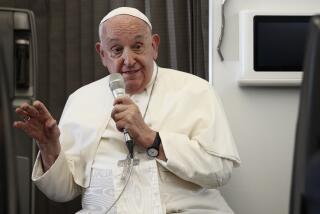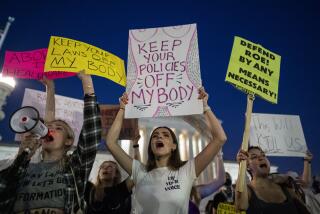John Paul II Reinforces the First Human Right: to Live : Abortion: The new encyclical shows that respect for every life is essential to civil liberty.
Politicians wish it would disappear. Three Supreme Court justices have instructed the American people to stop arguing about it. But, like slavery in the 1850s and desegregation in the early 1960s, abortion just won’t go away. Indeed, 22 years after the court claimed to have resolved the debate in Roe vs. Wade, abortion remains the most bitterly divisive issue in American public life.
Now comes “Evangelium Vitae” (The Gospel of Life), a lengthy encyclical from Pope John Paul II “on the value and inviolability of human life,” addressed to “all people of good will.” In this papal letter, released in Rome Thursday, the Pope displays a candor that even his critics may find refreshing amid the politicians’ hemming and hawing. For the Pope insists that the classic prohibitions against abortion and euthanasia are not examples of sectarian quirkiness. Nor are these prohibitions inimical to democracy. Rather, they are the unavoidable and unchangeable implications of a moral logic hard-wired into human beings, a universal, trans-cultural set of first principles that forbids our dehumanizing others by making them mere instruments for our ends.
I think John Paul II is precisely right on these points; others disagree. So, does “Evangelium Vitae” leave us stuck in the rut of an argument whose intellectual and rhetorical moves are depressingly familiar to all the combatants? Perhaps not. John Paul’s reflections on the cultural foundations of liberty remind us that freedom has a moral as well as political-legal structure, and his observations on the relationship between the fundamental right to life and the defense of all other human rights in a democracy, might help Americans across the political spectrum grasp precisely why the abortion issue won’t--indeed, can’t--be avoided.
Despite the caricatures of an “authoritarian” Pope trying to “impose” his theological views on others, John Paul II is, in reality, the world’s foremost defender of universal human rights. He once championed that position against fascists, communists and militarists. He now defends it against those who charge that the very idea of “human rights” is a species of Western cultural imperialism. On the contrary, the Pope urges, the inalienable “value and dignity of every individual as a human being” is the starting point for building a society governed by the rule of law rather than by arbitrary force.
But John Paul II is also deeply, even passionately, concerned about the social unraveling that inevitably follows our forgetting that freedom “possesses an inherently relational dimension.” Thus, “Evangelium Vitae” begins with a striking meditation on the biblical story of Cain and Abel. Cain’s evasive dodge--”Am I my brother’s keeper?”--embodies the constant human temptation to avoid responsibility for others. The same question, and the same evasion, are characteristic of those who imagine America as the Republic of the Imperial Autonomous Self. John Paul, however, suggests that a democracy capable of protecting the rights of all its citizens is possible only when those citizens understand that the answer to Cain’s question was, is and always will be, yes.
“Recognizing and protecting every man and woman as a person and not as an object to be used” is, the Pope argues, the moral foundation of democratic equality and the precondition for civil society. Unless that basic right to life is acknowledged in law, freedom’s foundations are gravely weakened as “society becomes a mass of individuals . . . without any mutual bonds.” In such a Hobbesian world, the quest for power inevitably dominates; and in that contest no one is secure, because the moral principle that legitimizes checks on arbitrary power--the absolute inviolability of innocent human life--has been tossed overboard.
“Evangelium Vitae” has many other important things to say: about irresponsible male sexual predators, about service to women in crisis, about adoption, about the moral legitimacy of step-by-step approaches toward laws protective of the unborn. But at this moment in American political history, the encyclical’s greatest contribution may be to remind us that democracy cannot long endure a situation in which “conscience itself . . . is finding it increasingly difficult to distinguish between good and evil in what concerns the basic value of human life.” Mr. Jefferson, Mr. Lincoln and Dr. King would have agreed.


